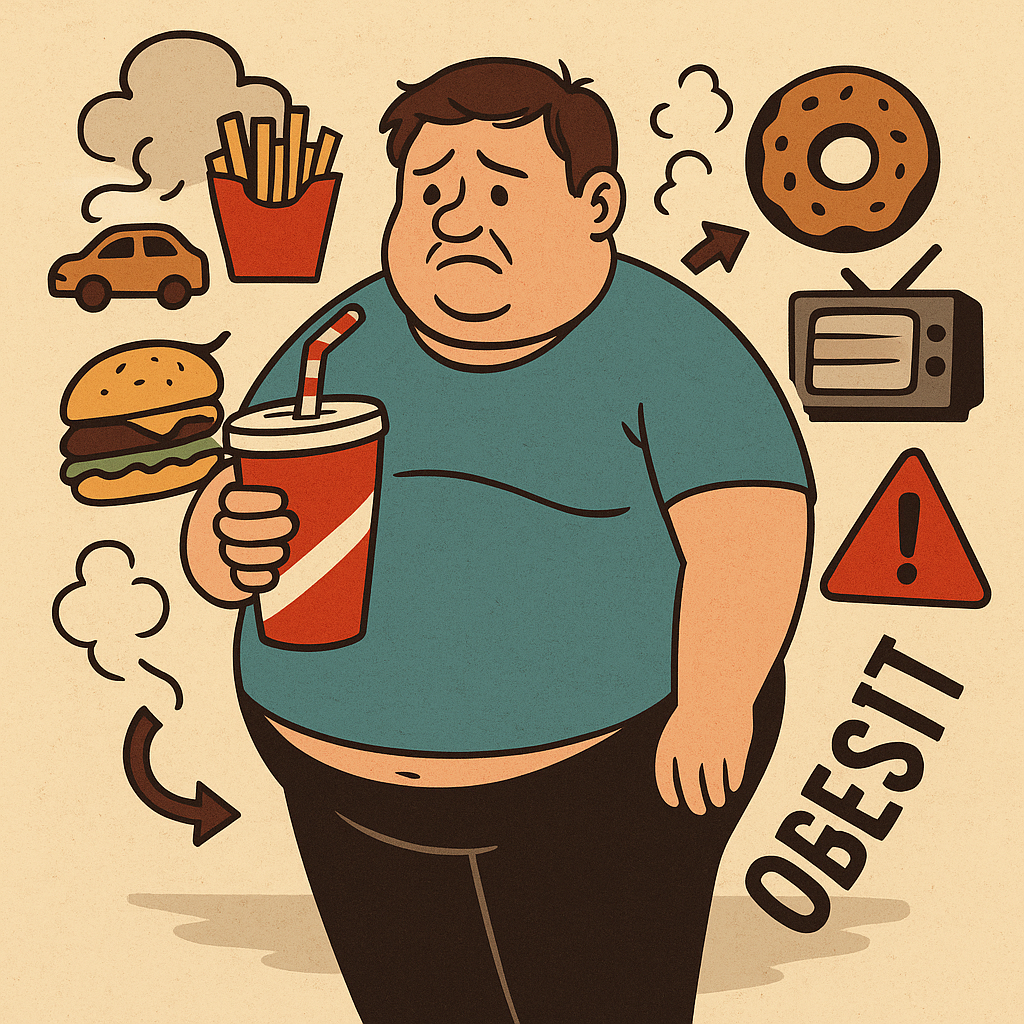The Social Drive for Obesity.

From a biological stance, humans are hard-wired to seek out food. (Lawrence, 2024) Our natural systems have become 'hijacked' by modern-day food production by 'addictive food-like substances' being marketed to us. (Gearhardt et al., 2023, Potvin Kent et al., 2018) In the last century, Western society has become 'brainwashed' by marketing (Tan et al., 2018) into thinking that these 'food-like products' (Pollan, 2008) are good for us or provide nutritional value - they do not.
The creation of the 'bliss point' (Moskowitz, 1971) 'perfect crunch' (Spence & Zampini, 2004) and other 'addiction-causing methods' have been used to create addictive tendencies when ingesting Ultra Processed Foods (UPF). (Gearhardt et al., 2023) UPFs lack micro-nutritional value and are dense with macronutrients, like fat and sugar. They are often made with chemicals that the body does not recognise or have a mechanism to process. (Lomer, 2015) The 'Yale Food Addiction Scale', found that food addiction is like addiction levels for substances like alcohol and tobacco. (Gearhardt et al., 2023)
Many societal rituals revolve around food, and overeating has become a 'tradition' for households in the West. Fasting, a protocol exercised by most cultures for centuries, has also been reduced in Western society, compounding issues that come with overeating.
The Effects of UPF
Many obese people are nutritionally deficient, causing hunger and food-seeking behaviours. (Garcia, 2009, Damms-Machado & Bischoff, 2012) Eating UPF has been seen to raise the rates of cancer (Abebe et al. 2025), 24% higher likelihood of ADHD symptoms among those consuming more UPF (Khazdouz et al. 2024), behavioural and cognitive deficits (Reichelt, 2016. Attuquayefio, 2017)) and a 16% increase in the likelihood of developing mental health issues. (Ejtahed, 2024)
The Fat Acceptance Movement
One social driver of obesity, morbid obesity and eating UPF is the 'Fat Acceptance Movement', a social acceptance movement that purports ideas such as 'health at any size' and that being fat is only undesirable because of modern-day ‘beauty standards’. The movement began to end stigma and discrimination towards fat people in the 1970s. (Schoenfelder & Wieser 1983) In modern times, it has morphed into something more detrimental. Advocating for unhealthy diets and encouraging self-abusive behaviours. (Stanford, 2022) The radicalisation of this movement in the third wave has led to a problematic view of morbid obesity that disconnects from biological facts. Allowing the societal 'set point' for morbid obesity to continue to increase could encourage more people to become obese. (Festigner, 1954)
How Do We Manage This Crisis?
Education is a place to start. Parents and adults need to take back their power when making food choices. Consumers who buy these foods ensure that the companies continue their production and marketing. Mass production makes the foods cheaper and informs the market of consumer desire. Market trends should follow if individuals can take personal responsibility for their food choices. Learning to cook plant-based, fresh and healthy food is vital to our society. Without good health, there can be nothing else. We must also educate that obesity is a form of self-harm - through self-esteem education, stress management and making changes to society, we can encourage change for us as individuals.
"There are a great many food-like items in the supermarket your ancestors would not recognize as food... stay away from these." (Pollan, 2008)
References:
Abebe, Z., Wassie, M.M., Nguyen, P.D. et al. Association of dietary patterns derived by reduced-rank regression with colorectal cancer risk and mortality. Eur J Nutr 64, 33 (2025). https://doi.org/10.1007/s00394-024-03513-9Links to an external site.
Attuquayefio, T., Stevenson, R. J., Oaten, M. J., and Francis, H. M. 2017. A four-day Western-style dietary intervention causes reductions in hippocampal-dependent learning and memory, as well as interoceptive sensitivity. PLoS ONE. 12:e0172645. doi: 10.1371/journal.pone.0172645
Damms-Machado, A., Weser, G., & Bischoff, S. C. (2012). Micronutrient deficiency in obese subjects undergoing low-calorie diet. Nutrition Journal, 11(1). https://doi.org/10.1186/1475-2891-11-34
Ejtahed, HS., Mardi, P., Hejrani, B. et al. Association between junk food consumption and mental health problems in adults: a systematic review and meta-analysis. BMC Psychiatry 24, 438 (2024). https://doi.org/10.1186/s12888-024-05889-8Links to an external site.
Festinger, L. (1954). A theory of social comparison processes. Human Relations, 7, 117–140. https://doi.org/10.1177/001872675400700202
García, O. P., Long, K. Z., & Rosado, J. L. (2009). Impact of micronutrient deficiencies on obesity. Nutrition Reviews, 67(10), 559–572. https://doi.org/10.1111/j.1753-4887.2009.00228.x
Khazdouz, M., Safarzadeh, R., Hejrani, B. et al. The association between junk foods consumption and attention deficit hyperactivity disorder in children and adolescents: a systematic review and meta-analysis of observational studies. Eur Child Adolesc Psychiatry 34, 825–834 (2025). https://doi.org/10.1007/s00787-024-02521-8
Lawrence, M. (2024). Fundamentals of a healthy and sustainable diet. Nutrition Journal, 23(1). https://doi.org/10.1186/s12937-024-01049-6]
Lomer MCE (2015) Review article: the aetiology, diagnosis, mechanisms and clinical evidence for food intolerance. Alimentary Pharmacology & Therapeutics. 41(3):262-275. doi:https://doi.org/10.1111/apt.13041 ;
Moskowitz, H. R. (1971). The sweetness and pleasantness of sugars. The American Journal of Psychology, 84(3), 387–405. https://doi.org/10.2307/1420470https://www.jstor.org/stable/1420470
Potvin Kent, M., and Pauzé, E. 2018. The frequency and healthfulness of food and beverages advertised on adolescents' preferred websites in Canada. J. Adolesc. Health. 63:102–7. doi: 10.1016/j.jadohealth.2018.01.007
Pollan, M. (2008). In Defense of Food: An Eater's Manifesto. Penguin Books.
Reichelt, A. C. 2016. Adolescent maturational transitions in the prefrontal cortex and dopamine signalling as a risk factor for the development of obesity and high fat/high sugar diet-induced cognitive deficits. Front. Behav. Neurosci. 10. doi: 10.3389/fnbeh.2016.00189
Schoenfielder, L. and Wieser, B. (1983) Shadow On A Tightrope: Writings By Women on Fat Oppression, San Francisco: Aunt Lute.
Spence, C., & Zampini, M. (2004). The role of auditory cues in modulating the perceived crispness and staleness of potato chips. Journal of Sensory Studies, 19(5), 347–363. https://doi.org/10.1111/j.1745-459X.2004.tb00159.x ;
Stanford, C. (2022). Exploring if fat acceptance movement perceptions impact health beliefs regarding obesity and health. https://openjournals.ljmu.ac.uk/index.php/PHIJ/article/view/709
Tan, L., Ng, S. H., Omar, A., and Karupaiah, T. 2018. What is on YouTube? A case study on food and beverage advertising in videos targeted at children on social media. Child Obesity. 14:280–90. doi: 10.1089/chi.2018.0037
